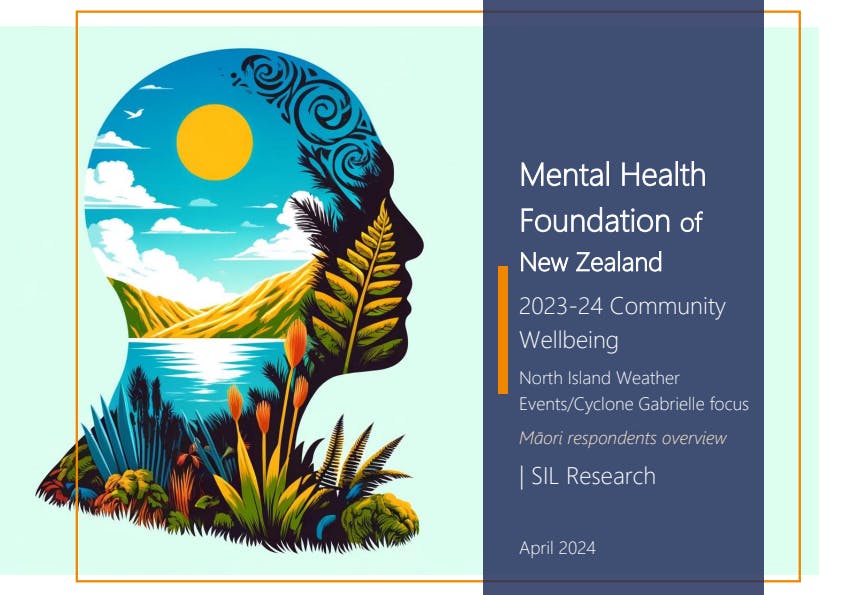Mental Health Foundation New Zealand 2023-24 wellbeing North Island weather Cyclone Gabrielle focus
Author:
SIL ResearchSource:
SIL Research, Mental Health Foundation of New Zealand, Tāmaki Makaurau Recovery Office, Auckland CouncilPublication date:
2024Topics:
Environment ,PeopleMental Health Foundation of New Zealand 2023-24 community wellbeing North Island weather events. Cyclone Gabrielle focus. Survey report
Extract
Executive summary
The main aim of this research was to gain insight into the wellbeing of communities affected by the North Island Weather Events/Cyclone Gabrielle. The research began with quantitative data collection to establish baseline wellbeing measurements. This was followed up with qualitative methods to explore the nuances and context behind the quantitative findings.
The survey was undertaken between 12 December 2023 and 29 February 2024. Multiple data collection channels were utilised to ensure representation, including: postal surveys (a total of 6,000 copies), computer-assisted telephone interviews, social media advertising, online panel and other online/web-based (available via Mental Health Foundation and Auckland Council channels). A total of n=1,524 surveys were used in the final analysis. Weighting (post-stratification) was applied to the collected survey data to reflect the actual proportions of sub-group populations (e.g. by age, gender and ethnicity) in the regions (Hawke’s Bay, Gisborne and Auckland), as determined by Statistics New Zealand's 2018 Census data.
In addition to the main survey, focus groups, targeted interviews, community meetings, and hui, were designed and conducted (up till end-March 2024) to obtain more in-depth, qualitative feedback, supporting and providing additional details to the overall quantitative findings. The in-depth sample included n=54 participants.
The main findings related to specific objectives of the research included the following: [Extracts]
Impacts of 2023 weather events
- The 2023 extreme weather events had a strong, diverse and widespread impact on local communities across multiple regions: 6-in-10 respondents (59%) reported experiencing a direct negative impact on themselves or their families; including physical and community impacts (63%, e.g. property damage, flooding, content damage, evacuation, loss of power and communication, impact on work, etc.), mental/emotional impacts (43%, e.g. stress, weather anxiety, feeling unsafe, etc.), and other personal/health impacts (46%).
- Primary negative impacts were particularly pronounced in Wairoa (76%), Northland (75%), Hastings (69%), Gisborne (67%), and Napier (66%).
- As expected, specific impacts differed across regions and within communities depending on local conditions, highlighting the diverse array of challenges faced by different communities even within the same region. Generally, rural respondents were more likely to experience property damage, travel disruptions, physical and social isolation (with loss of communications), work disruption and related financial impacts.
- Across regions, property damage and flooding concerns were more pronounced in Hastings (especially rurally) and Auckland; Gisborne and Northland residents emphasised infrastructure (roading/bridge) issues leading to travel disruptions and isolation; emotional impacts were more prevalent in both Gisborne and Wairoa; Napier residents were more likely to be impacted by power loss.
- The consequences of the weather events were apparent even among those experiencing no direct impact; 7-in-10 (70%) of these respondents (or 28% of the total sample) reported indirect secondary impacts or stressors, particularly empathetic distress for others (49%) or the local environment (32%).
- Extreme weather events had a clear and substantial negative impact on residents’ wellbeing, measured across multiple indicators: wellbeing scores, mental health wellbeing, perceived loneliness, reported health, life satisfaction and income adequacy. Greater effects (less positive outcomes) were measured among people more heavily affected by events - particularly by primary negative impacts.
- While secondary stressors also had a notable effect on mental wellbeing, feeling less safe, feeling lonely and neighbourhood perceptions, little effect was found on overall wellbeing or other attributes.
- Overall, Northland residents indicated the highest mental distress and lowest wellbeing scores regardless of reported weather impacts. ...
SIL Research, Mental Health Foundation of New Zealand, Tāmaki Makaurau Recovery Office, Auckland Council
April 2024
See also
Mental Health Foundation of New Zealand, All Sorts website
Knowledge Auckland: Other storm recovery documents
Auckland Council website:
Recovery from extreme weather and natural disasters
